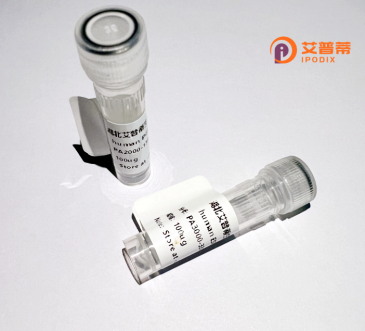
| 纯度 | >90%SDS-PAGE. |
| 种属 | Human |
| 靶点 | EXOD1 |
| Uniprot No | A8K979 |
| 内毒素 | < 0.01EU/μg |
| 表达宿主 | E.coli |
| 表达区间 | 1-328aa |
| 氨基酸序列 | MATKRLARQLGLIRRKSIAPANGNLGRSKSKQLFDYLIVIDFESTCWNDGKHHHSQEIIEFPAVLLNTSTGQIDSEFQAYVQPQEHPILSEFCMELTGIKQAQVDEGVPLKICLSQFCKWIHKIQQQKNIIFATGISEPSASEVKLCAFVTWSDWDLGVCLEYECKRKQLLKPVFLNSWIDLRATYKLFYRRKPKGLSGALQEVGIEFSGREHSGLDDSRNTALLAWKMIRDGCVMKITRSLNKGPFLLPSWTWNSDLASGDQHAFLKQEFGCGTYRTLLQKPNMSKQEKGNILWLTMVWLSLACLQRKNYNDCMLNTASQTVTTEKF |
| 分子量 | 63.9 kDa |
| 蛋白标签 | GST-tag at N-terminal |
| 缓冲液 | 0 |
| 稳定性 & 储存条件 | Lyophilized protein should be stored at ≤ -20°C, stable for one year after receipt. Reconstituted protein solution can be stored at 2-8°C for 2-7 days. Aliquots of reconstituted samples are stable at ≤ -20°C for 3 months. |
| 复溶 | Always centrifuge tubes before opening.Do not mix by vortex or pipetting. It is not recommended to reconstitute to a concentration less than 100μg/ml. Dissolve the lyophilized protein in distilled water. Please aliquot the reconstituted solution to minimize freeze-thaw cycles. |
由于目前(截至2023年)关于“人EXOD1蛋白”的研究较为有限,且公开数据库中未明确收录该名称的蛋白相关文献,可能存在以下情况:
1. **名称差异**:EXOD1可能是某个基因或蛋白的非标准命名或别名,需进一步确认标准化名称(如通过UniProt数据库查询)。
2. **新兴研究方向**:该蛋白可能是新近发现的分子,相关研究尚未广泛发表。
**建议替代方案**:
- 检索与 **EXOD1可能关联的生物学功能**(如DNA修复、外泌体相关通路)的文献,例如:
1. **"Mechanisms of DNA repair in mammalian cells"**
*Author: Lieberman, R.*
*摘要*:综述真核细胞中DNA修复通路的关键蛋白及其作用机制,包括核酸酶家族潜在成员的讨论。
2. **"Recombinant protein production in E. coli: advances and challenges"**
*Author: Gupta, S.K., et al.*
*摘要*:探讨重组蛋白(包括核酸酶类)的优化表达与纯化策略。
3. **"Functional annotation of novel human genes by CRISPR screening"**
*Author: Wang, T., et al.*
*摘要*:通过高通量筛选技术解析未知功能基因(如EXOD1)在细胞周期或凋亡中的作用。
如需精准文献,请提供EXOD1的 **UniProt ID** 或 **Gene ID**,以便进一步核查!
**Background of Recombinant Human EXOD1 Protein**
Recombinant human EXOD1 (Exonuclease Oligonucleotide Binding 1) is a engineered protein derived from the human *EXOD1* gene, designed for functional and structural studies. EXOD1 is implicated in DNA repair mechanisms, particularly in homologous recombination (HR), where it facilitates DNA strand resection—a critical step in repairing double-strand breaks. Its exonuclease activity enables processing of damaged DNA ends, promoting genome stability. Dysregulation of EXOD1 is linked to genomic instability and potential roles in cancer progression or therapeutic resistance, making it a target for oncology research.
Produced via expression systems like *E. coli* or mammalian cells, recombinant EXOD1 is purified to homogeneity, often with tags (e.g., His-tag) for detection and isolation. Its biochemical properties, including substrate specificity and interaction partners (e.g., BRCA1. RAD51), are studied to elucidate HR pathway dynamics. Additionally, recombinant EXOD1 serves as a tool for in vitro assays exploring DNA repair efficiency, CRISPR-based editing optimization, or screening small molecules for modulating exonuclease activity. Current research focuses on its therapeutic potential as a biomarker or target for cancers with defective DNA repair mechanisms.
×